Indiana University:
A leader in human-centered AI research
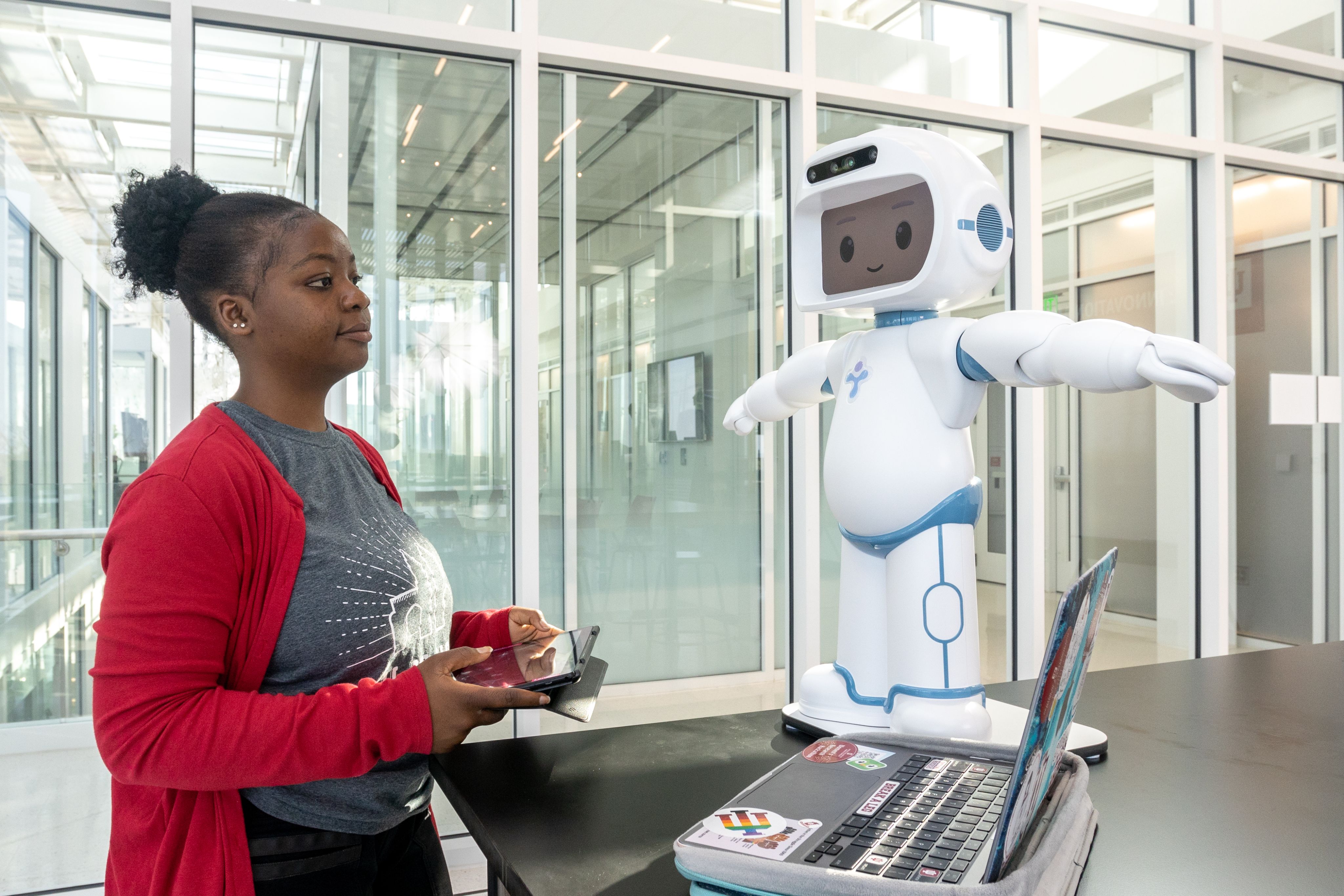
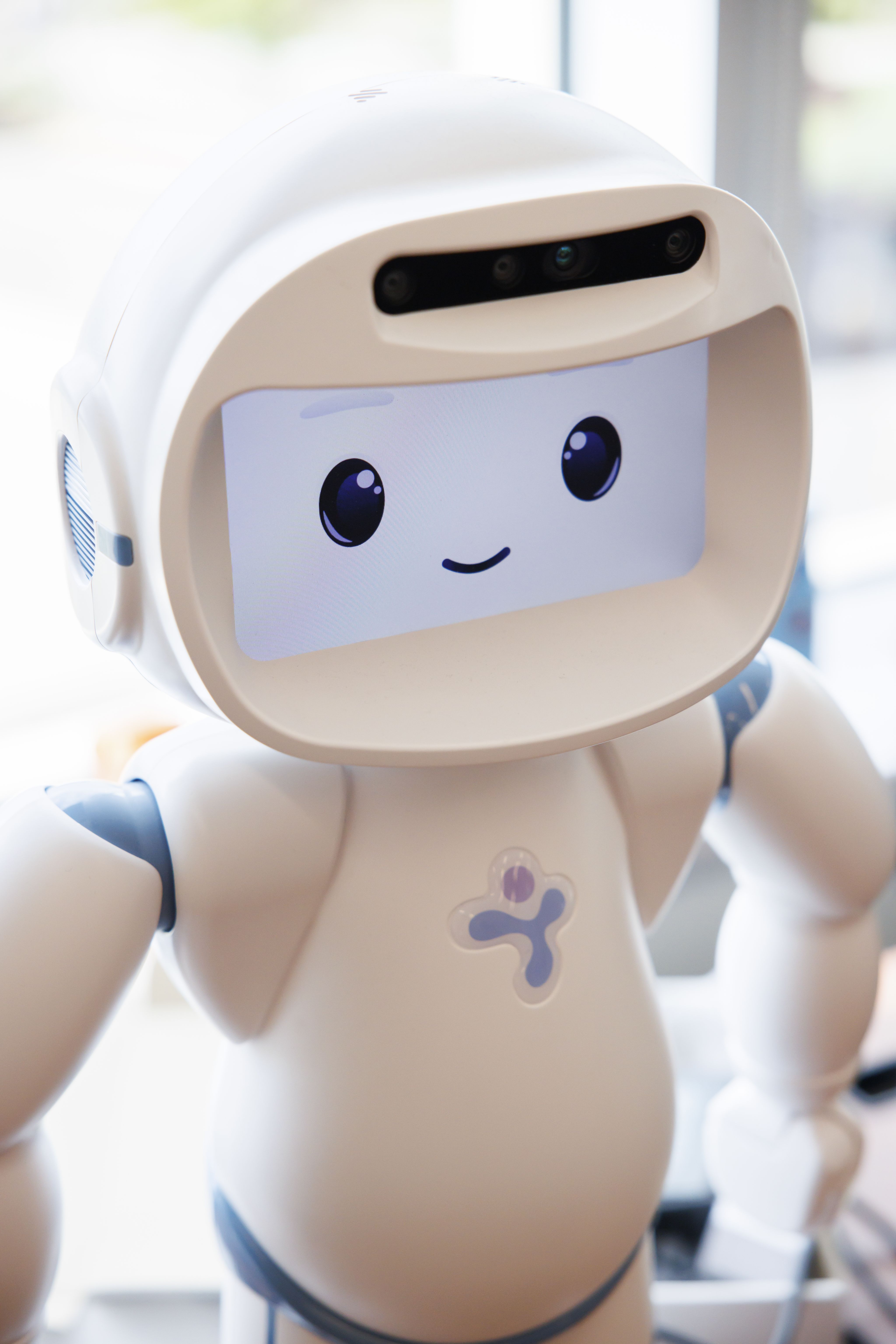
At the most recent United Nations' AI for Good Global Summit in Geneva, Switzerland, an event that drew more than 4,000 participants from 183 countries, Indiana University computer science professor and artificial intelligence expert David Crandall was nearly brought to tears.
At the summit, Crandall and several of his IU colleagues encountered a young man with special needs who was talking with an AI-based social robot. The robot, named I.R.I.S., which stands for Interactive Robot for Ikigai Support, talks to and offers suggestions to help people find purpose and meaning in their lives. It was designed and built by faculty and student researchers from IU and the Toyota Research Institute.
The young man told the robot he wanted to be a policeman. I.R.I.S asked, “Why?” The young man said because he liked to help and save people. I.R.I.S. responded that maybe he could consider volunteering at a local pet shelter. The conversation went on for more than 10 minutes.
“His parents asked if they could buy our robot because they rarely saw him engage in a conversation like that,” says Crandall. “He might not have been comfortable talking with another person, but he was engaged with the robot.”
Such interactions illustrate the positive impacts of IU’s human-centered approach to AI research and related applications.
As AI rapidly revolutionizes the way we live, work, learn and interact with one another, IU researchers are at the forefront nationally and internationally in generating new knowledge and understanding of AI-based technologies. Their goal: To generate insights that will ensure that these technologies are designed and developed with people in mind, and ultimately yield improvements in the human condition.
“It’s not about creating AI systems that are going to take over and replace people,” said Crandall. “It’s about how to make AI systems that will help us live better lives.”

Exploring real-world impacts on people and society
Crandall is a professor of computer science at IU’s Luddy School of Informatics, Computing and Engineering, founded in 1999 as the first-ever school in the nation dedicated to multidisciplinary research and degree programs focused on informatics. Today it is one of IU’s largest and most popular schools.
Housed within the Luddy School, IU’s Luddy Artificial Intelligence Center comprises more than 50 faculty members and over 25 labs, centers and institutes conducting AI-related research. The center has become a hub for human-centered AI education, research and service, bringing together researchers from nearly every college and school at the university whose work ranges from the theoretical foundations of AI to how it is being applied to solve real-world problems, how it is impacting our society and what it says about us as human beings.
For center researchers, the response to the I.R.I.S. robot at the recent U.N. summit underscored the potential major benefits of IU’s human-centric and holistic approach to addressing the opportunities and challenges of AI.
Center researchers developed the I.R.I.S. robot as part of a project to determine how an AI-controlled robot can help older adults maintain and expand their purpose in life (called “ikigai” in Japan) by learning more about them and responding to their needs and wants. To enable the robot’s social interaction capabilities and activities it could perform, the researchers worked to solve various technical challenges. However, they also talked to potential users, including older adults from a local memory care facility, to test the robot and solicit feedback, which they could then incorporate into the process of designing a robot that people would trust and want to interact with.
“A lot of AI work centers around people,” Crandall says. “Even the highly technical work is not about building AI for AI’s sake, but to ensure AI can communicate with people, learn from people and its own experience, explain its reasoning to people, improve people’s health and well-being, protect people’s privacy and security, complement people’s artistic expression, help people learn better, and so on.”
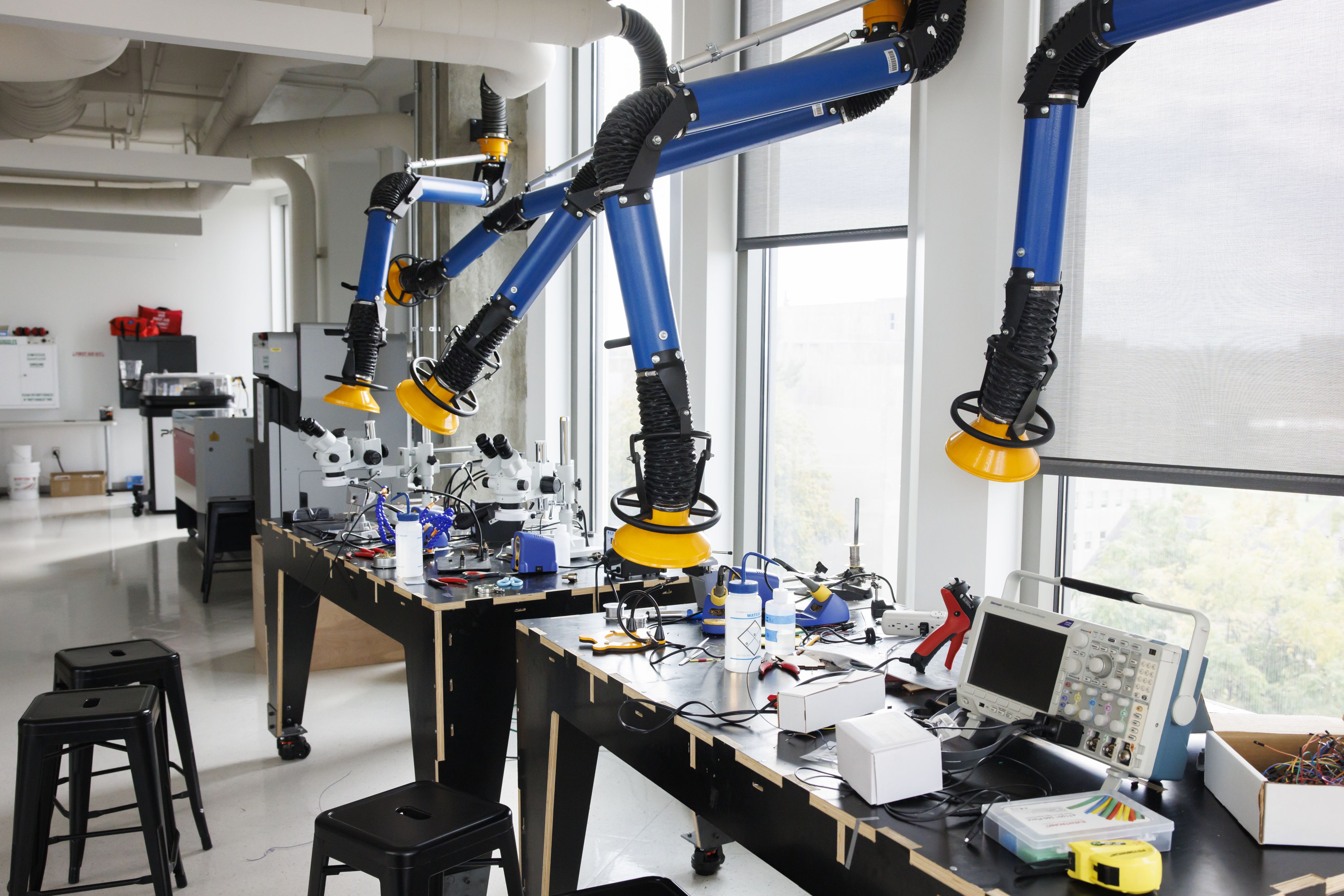
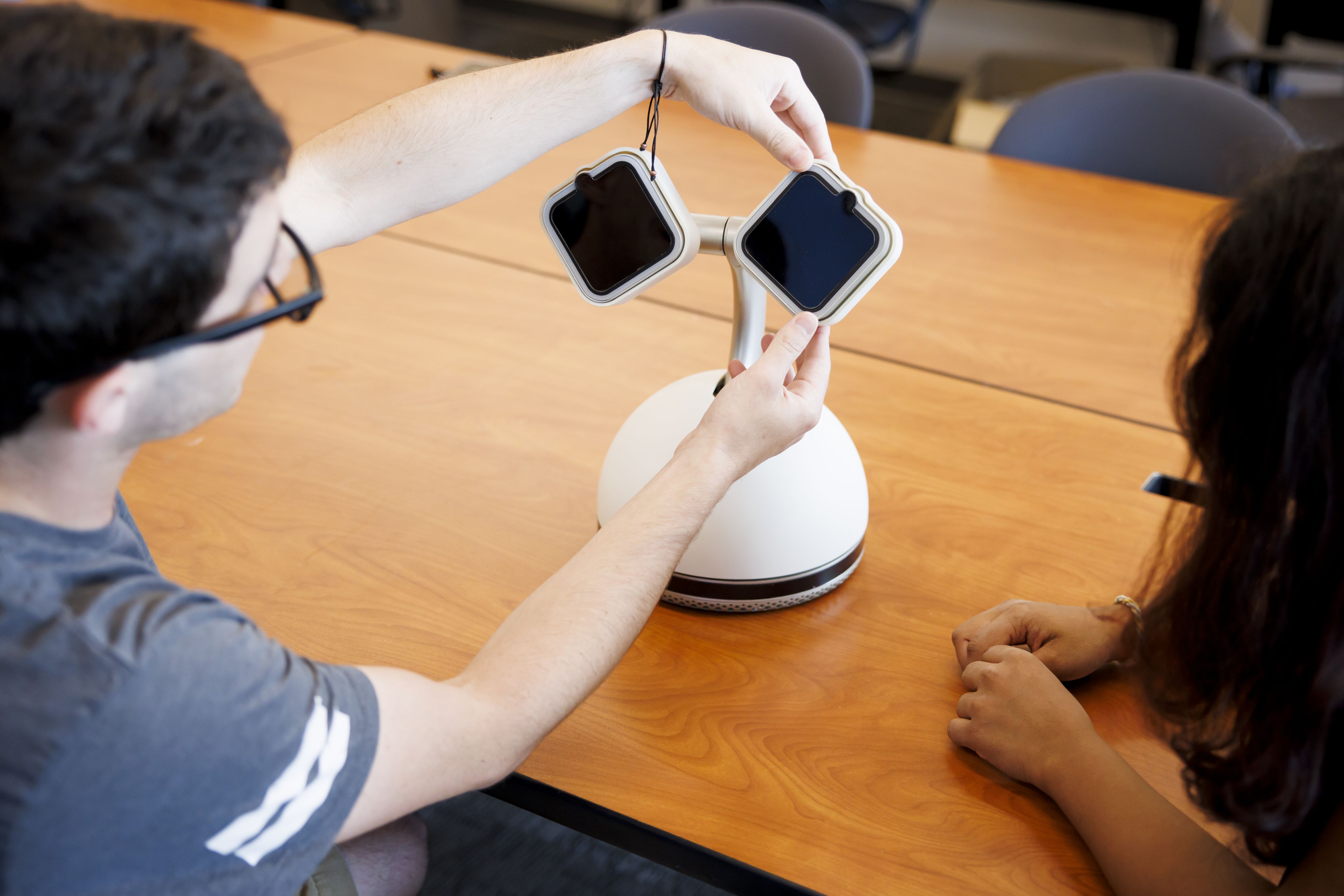
Pushing the boundaries of AI discovery through innovative research, education and partnership
Across IU, researchers are collaborating to advance innovations in human-centered AI initiatives for the betterment of society.
Researchers from the IU School of Medicine, the nation’s largest medical school and home to one of the country’s oldest Alzheimer’s disease research centers, are participating in a National Institutes of Health-funded effort that will use AI to analyze thousands of genetic data to more quickly discover disease detection markers for Alzheimer’s. The project could help identify new targets for drug discovery, leading to treatment and eventually prevention of Alzheimer’s.
IU is also a principal organization in two of the U.S. National Science Foundation’s 11 National Artificial Intelligence Research Institutes. These institutes are focused on AI-based technologies that will result in advances such as enhancing adult online learning, increasing food supply chains, improving transportation systems and strengthening cybersecurity.
Collaboration among IU’s top researchers and those at partner institutions is also at the center of Accelerating Imagination, an ambitious new initiative that aims to catalyze human-centered AI research and generate new AI-based applications to advance important work in education, business, government and other key industries.
IU’s investment in AI research and teaching not only provides unique opportunities for its students but is also enhancing K-12 education. Through the AI Goes Rural project, IU is developing AI curricula with middle school STEM teachers for implementation in rural areas, while IU’s involvement in the National Science Foundation’s EngageAI Institute is advancing technologies that can be used for more effective teaching in grade school classrooms.
IU is accelerating its commitment to integrating AI literacy and hands-on experiences into all of its academic disciplines, preparing students in the arts, business, computer science and informatics, the natural and social sciences, media and more for successful careers in the 21st century workforce and fostering innovation that helps solve society’s greatest challenges.

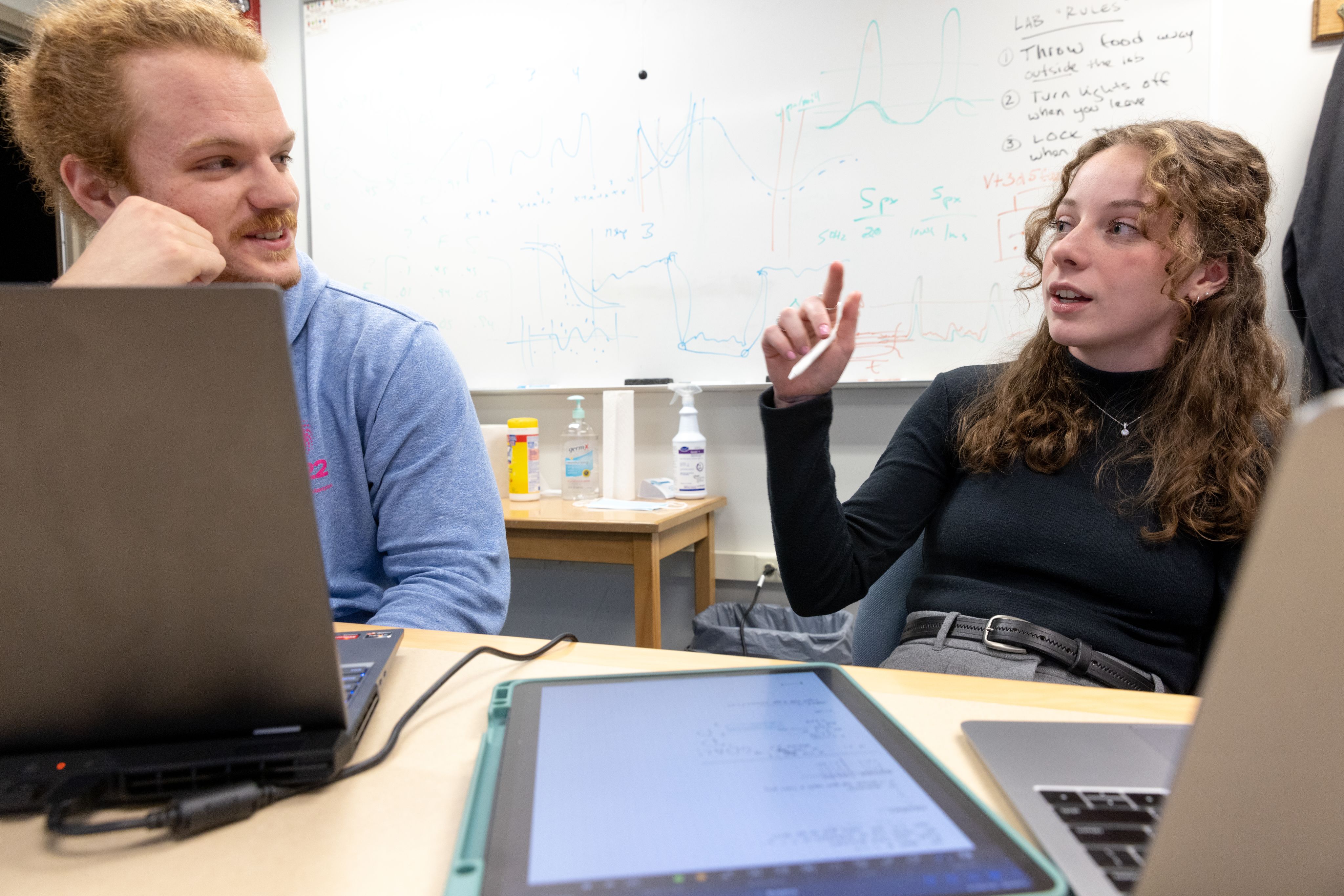

A national and global impact
One of the nation’s leading public research universities, IU enrolls more than 90,000 students across 930+ academic programs, seven campuses, two regional academic centers and nine School of Medicine campuses. The university’s IU Online program includes more than 8,600 students and features 232 degree and certificate programs—all taught and developed by IU faculty.
IU also has five global gateway offices that link IU students and faculty to opportunities around the world and connect internationally based students, alumni and partners to IU.
Founded in 1820, IU boasts a world-class educational enterprise with the country’s largest medical school; the world’s first school of philanthropy, the Lilly Family School of Philanthropy; nationally top-ranked schools such as the Kelley School of Business and O’Neill School of Public and Environmental Affairs; the Luddy School of Informatics, Computing and Engineering, the nation’s first school of informatics; and the Jacobs School of Music, one of the top schools in the world for music education and performance.
The university’s campuses are united by IU 2030, an aspirational vision for a bold and ambitious future focused on student success and opportunity, transformative research and creativity, and service to the state of Indiana and beyond. Learn more at iu.edu.

This content was paid for and created by Indiana University. The editorial staff at The Chronicle had no role in its preparation. Find out more about paid content.


